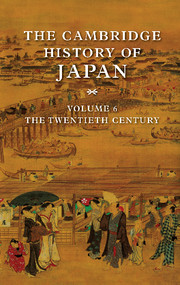1 - Introduction
Published online by Cambridge University Press: 28 March 2008
Summary
Writers of contemporary history face a curious paradox. Because they have lived through the period they describe, they should have an easy time writing about it. But in fact, the contemporary historians' task is far more intractable than is that of the medievalists who have no direct experience of the world they study. The medievalists' task is made easy by the fact that moth and rust have destroyed much of the evidence for their period. By contrast, evidence at the contemporary historians' disposal is, for all practical purposes, limitless. For every volume of Kamakura ibun, for example, there are shelf miles of official papers, private papers, books, periodicals, photographs, and films documenting even a single year of the twentieth century. This embarrassment of riches provides contemporary historians with an amount of material that the medievalists cannot hope for even in their wildest dreams, yet this abundance limits what contemporary historians can confidently understand in a lifetime. Contemporary historians can explore a narrow problem definitively in a way that medievalists cannot, but they have more difficulty grasping the larger context of that problem.
In a sense, contemporary historians know too much but understand too little. Although the medievalists may never really be sure how Minamoto Yoritomo died, they can have few doubts about Yoritomo's place in history. On the other hand, even though the health and political problems of a contemporary politician like Tanaka Kakuei are chronicled in the daily press, the contemporary historians cannot be entirely confident about their assessment of Tanaka, if only because he is still alive and his biography not yet complete.
- Type
- Chapter
- Information
- The Cambridge History of Japan , pp. 1 - 52Publisher: Cambridge University PressPrint publication year: 1989

